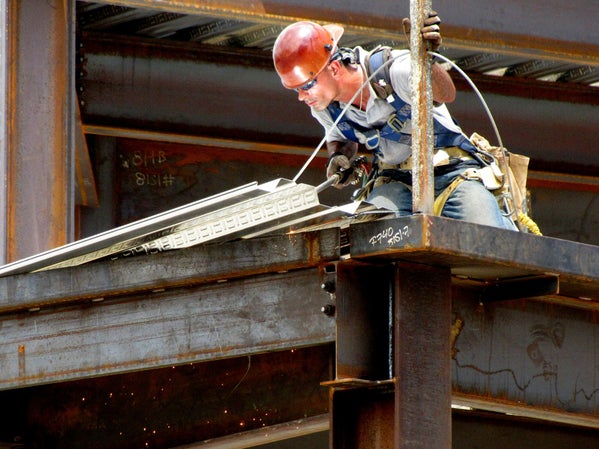Advanced Manufacturing
At A Glance: Structural Metal Fabricators and Fitters (Fabricators)
Structural metal fabricators and fitters are responsible for fabricating, positioning, aligning, and fitting parts of metal products. Their job depends on physical strength and machinery. To align and fit parts, they may require the use of specialized equipment like jacks, pry bars, hammers or hoists and cranes. To properly position parts, fabricators and fitters must be able to read blueprints and technical drawings.
To become a structural metal fabricator or fitter requires at least a high school diploma and one to two years of on-the-job training. Some employers will require additional certifications or the completion of an apprenticeship program. Structural metal fabricators and fitters earn approximately $18.89 an hour.
Entry Level Requirements
High School Diploma
To become a structural metal fabricator and/or fitter requires at least a high school diploma. Some positions require a post-secondary certificate or some college coursework.

Material Engineering:
Top 5
Industry in our region.
How much can I make?
Hourly Rate: $13 - $29/HR.
Job Details: Structural Metal Fabricators and Fitters (Fabricators)
Video produced and provided by CareerOneStop.org
Commonly Performed Tasks
There are many tasks that structural metal fabricators and fitters must perform regularly. They are responsible for the production of metal parts and the assembly of products and structures. To create and move parts, they must know how to use many machines, tools, and processes.
- Verify conformance of workpieces to specifications, using squares, rulers, and measuring tapes
- Align and fit parts according to specifications with jacks, drift pins, pry bars, and hammers
- Move parts into position, manually or with hoists or cranes
- Align and weld parts to form units with blueprints and specifications using jigs, torches, and tools
- Study engineering drawings and blueprints to determine materials requirements and task sequences
Required Job Skills
Structural metal fabricators and fitters require specific skills, abilities and knowledge to do their jobs effectively. Their job requires the use machines, tools, and physical strength in order to make, move, and position parts properly.
- Effective oral and written communication
- Comprehend complex informational text and visuals
- Identify, analyze, and solve complex problems
- Physical strength and dexterity
- Knowledge of machines, tools, and materials
Education & Training Information
Programs and Opportunities
Eastern Gateway Community College - Main Campus
Program: Welding
Certification: Associate's Degree
Length: 2 Years
West Virginia Northern Community College
Program: Welding Structural Steel, Advanced
Certification: Certificate
Length: 2 Years
Pennsylvania College of Technology
Program: Welding and Fabrication Engineering Technology
Certification: Bachelor's Degree
Length: 4 Years
Community College of Allegheny County - West Hills Center
Program: Welding Technology
Certification: Associate's Degree
Length: 2 Years
Eastern Gateway Community College - Main Campus
Program: Advanced Welding
Certification: Certificate
Length: 1 Year
